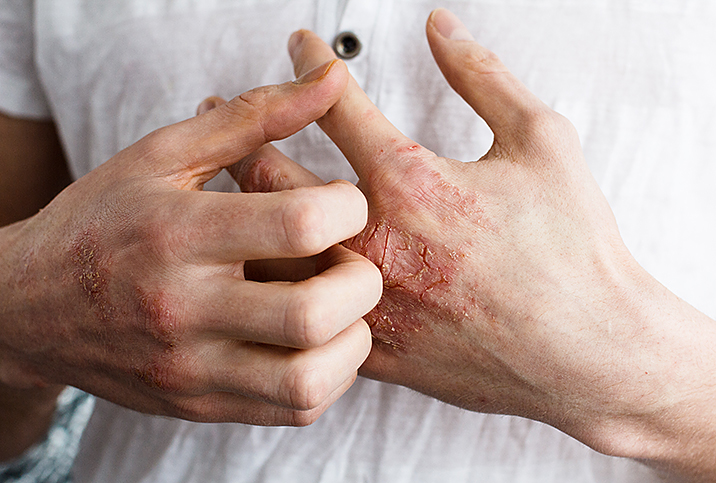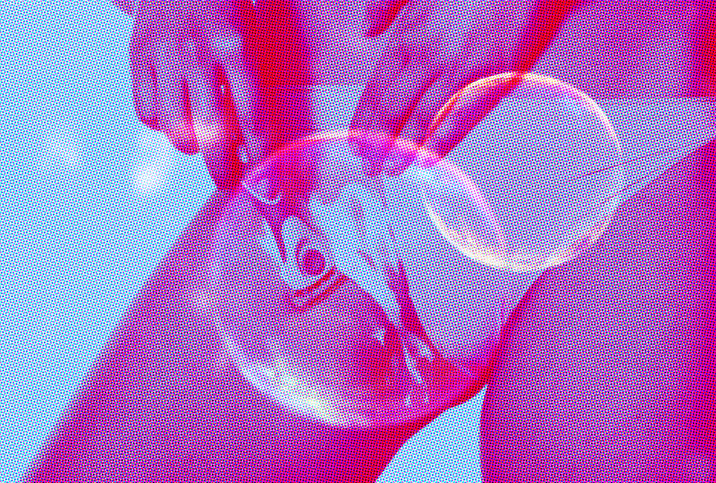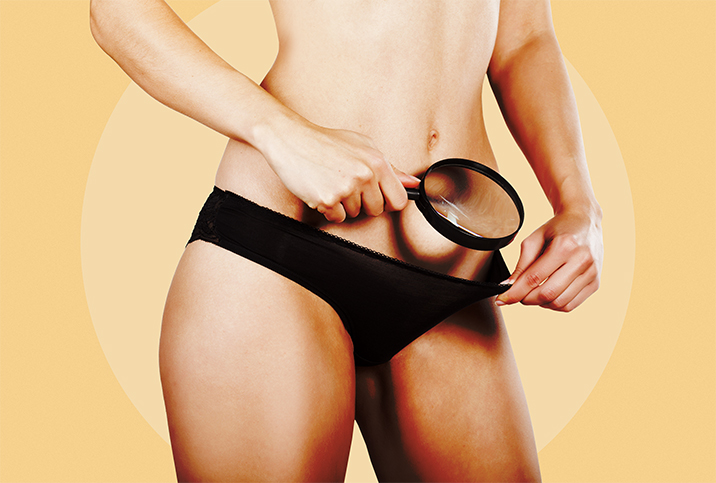A Dating Guide for Eczema

We live alongside a digital world obsessed with telling everyone to "just love themselves," but this rhetoric does not always translate to real-life interactions. For instance, the stigma attached to visible skin conditions, after centuries, still holds true.
In the U.S., 31.6 million people have some form of eczema. One in 10 people will develop the condition during their lifetime. Although the prevalence peaks in early childhood, anyone can develop eczema at any age. Medical stock photos might tell a different story, but rates of eczema between skin colors, races and ethnicities is relatively evenly matched at between 10 percent and 13 percent.
The early stages of dating are meant to be about careful exploration, revealing the tougher bits of ourselves one manageable chunk at a time. Frustratingly, living with a visible condition like eczema undermines this by exposing our physical and emotional vulnerabilities before we are ready to divulge.
The symptoms of eczema
While eczema is a widely known condition, there are actually seven different types, including nummular eczema, neurodermatitis and dyshidrotic eczema.
"Eczema—or atopic dermatitis—is a common inflammatory skin condition that affects approximately 20 to 30 percent of children and up to 10 percent of adults," said Geeta Yadav, M.D., a board-certified dermatologist. "It often begins in childhood but can appear in adulthood, even in your 60s. It is usually associated with intense itching, and the skin changes can be red, scaly, oozy or crusted. In darker skin tones, it might appear more purple or gray colored."
Some people have genetic factors that trigger the condition, while others experience environmental triggers, particularly in winter when the air is less humid. For some, the condition will always be mild, but for others, it can be debilitating.
"I was diagnosed with an extreme version of it at birth," said Manuela Simo, a student and entrepreneur who has had intense treatments for the condition throughout her life. "As anybody with this skin disorder can tell you, one treatment is never effective for long. I was 10 years old when I entered my first aggressive treatment against eczema: My doctor told my mom that every night I had to apply a very thick petroleum cream and a few steroid creams all over my body with wet bandages over it so the moisturization would stay in my skin. I'm pretty sure you can imagine, it was super uncomfortable."
Eczema is exacerbated by various factors, such as stress, excessive hand-washing and allergens. While generally a manageable condition, finding consistent eczema treatment is trial and error—determining triggers is a particularly useful method of lessening flare-ups.
Impact on dating self-esteem
The stigma attached to skin conditions undeniably damages self-confidence, especially for people navigating the dating world.
"The relationship that I have with my skin has always been very complicated," Simo said. "After all, I was made aware at a very young age that my skin was not considered 'normal.'"
We live in a world highly reliant on visual cues, which feed directly into our self-esteem, so having a visible medical condition that fractures people's expectations of beauty threatens the development of healthy self-esteem. Research, including a study published in January 2021 in the Journal of Dermatology and Skin Science, has largely connected low self-esteem to skin disorders and a lack of social support.
"From the regular skin outbreaks to the bimonthly visits at the hospital, the way people were observing my skin and always trying new treatments to appease my situation was a significant source of stress for me," Simo continued. "It took me a while to feel good about myself, especially when I kept dealing with individuals teasing me about having 'alligator skin' or even wondering if I was contagious. Honestly, this whole situation made me feel like I would never be considered beautiful."
The first step to rejuvenated self-esteem is to focus on individual self-care and to remove unhealthy influences—including people—from your life. Stress tempts eczema flare-ups and, while easier said than done, disconnecting from judgmental people will serve you well.
"What I learned from it, and surprisingly could also be applied to my daily life, was that there was no reason to overthink this and go crazy about it," added Simo. "The reaction is already happening, so it is best to relax, take one step at a time, and just let the situation pass, because surprisingly, it always does."
Never open up at your own expense
Managing a life-altering skin condition is already enough stress to deal with—if you're emotionally unprepared, adding dating to the mix will ravage you. Before diving into the dating world with wild abandon, understand how the condition will affect your experiences.
"Dating with a skin condition can be quite devastating, especially in the digital age where the value of physical appearance is amplified," said Chris Pleines, chief dating officer at DatingScout. "Attractive people in the general sense receive more positive attention, but it is also true that that's only skin-deep. These things fade and a person finds a long-term partner based on personality. The only real challenge is how to strike that connection for the first time, especially with a 'visible' medical condition."
Any person with unresolved self-esteem issues may not be ready to face the judgments of strangers. "It took me a while to feel confident enough to get into a relationship," Simo said. "Whenever I was on dates or having a conversation with them, I could always feel like their eyes were slowly fixating on these scars on my skin and that they had questions that they were refraining from asking. And since my self-esteem is something that I still struggle with, these behaviors were enough to drive me away."
Reinforcing your self-esteem with a healthy dose of self-love and self-reflection will enable you to enjoy the dating world, not fear it. "Take your time to heal and recuperate, take care of yourself and continue your medications if there are any," Pleines said. "If you feel like your body is ready to date again, do so. Remember, the right one will love you regardless of your skin problem."
There is nothing wrong with being picky—unless you are literally picking at yourself, in which case, leave your precious skin alone, please—so take the time to choose a partner with whom you'll feel comfortable. There are plenty of people in the world who are not so shallow as to lose interest because of something as innocuous as a skin condition.
"I'm lucky enough to have a fantastic partner—honestly, I could not ask for someone better," Simo said. "Obviously, when we first met, I was worried about how he would react to skin like mine and the questions he would ask me. But, as if he could read through my mind and see my worries, he never made me feel like my skin could be an obstacle in my daily life."
Eczema doesn't spell the end of romance
When it feels as though our bodies are betraying us, it is exceptionally difficult to treat it with love or patience. We wonder why the condition came to haunt us, what we did to deserve it and whether we will ever be free.
"The most important thing to recognize is that you are not alone with your diagnosis and there are really excellent treatments available today that are both over the counter and prescription," said Yadav. "Be gentle with yourself—that's the first step toward being comfortable in your own skin."
There is no simple answer to treating a skin condition, but there is one when it comes to dating with one: Do not give up. Romance, sex, dating and sensuality are meant for everyone who is legally able to enjoy and is interested in enjoying them, regardless of any diagnoses.
"This skin disorder doesn't define who you are and how other people see you, so try not to worry so much about it," Simo said. "The right person will see you for who you are and will not let your condition stop them from wanting to get to know you as a person."


















